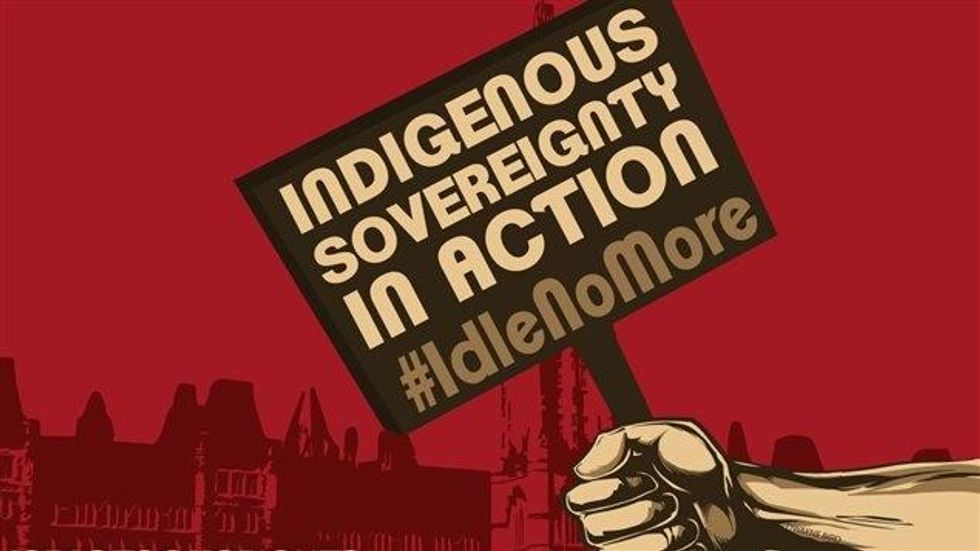Our collective action in Idle No More has shown that there is support among Canadians for a movement that embodies principled opposition to the destruction of the land and the extension of social justice to Indigenous peoples. When we as Indigenous people have a political agenda that's consistent with our Original Teachings - to have a respectful relationship with the land and the natural environment and to have a respectful relationship among all of the nations that share this land - we have seen that this is a powerful draw for many people in our own nations and in the broader society.
But it is clear too that the movement has plateaued. Much of the passion, urgency and attention Idle No More generated is dissipating in the wake of Chief Theresa Spence's fast and the "13 Point Declaration" supported by Chief Spence, the Assembly of First Nations and the two Canadian opposition parties - which to many people in the movement represents a cooptation of the movement's demands by the chiefs of the Assembly of First Nations in support of their ongoing negotiations and long-running bureaucratic processes.
The question in the minds of many people in the movement who are committed to more serious and transformational goals is how do we revive the momentum driving us towards fundamental change that we had at the start of the movement? I think that the only way to keep this movement going is for us to see our actions in Idle No More as part of a larger and long-standing commitment to the restoration of Indigenous nationhood.
We need to focus our activism on the root of the problem facing our people collectively: our collective dispossession and misrepresentation as Indigenous peoples. Now is the time to put ourselves back on our lands spiritually and physically and to shift our support away from the Indian Act system and to start energizing the restoration of our own governments. Our people and our languages and our ceremonies should be saturating our homelands and territories. Our leaders should answer to us not to the Minister of Indian Affairs or his minions. Our governments should be circles in which we all sit as equals and participate fully and where all of our voices are heard, not systems of hierarchy and exclusion legitimized and enforced by Canadian laws. Restoring our nationhood in this way is the fundamental struggle. Our focus should be on restoring our presence on the land and regenerating our true nationhood. These go hand in hand and one cannot be achieved without the other.
Idle No More has been a good and necessary thing. Like thousands of others over the last couple of months, I am proud to have been a whole-hearted participant in educating the wider public, making the connection between our Native rights and the democratic rights of all citizens, and arguing for the protection of the environment under the Idle No More banner. But the limits to Idle No More are clear, and many people are beginning to realize that the kind of movement we have been conducting under the banner of Idle No More is not sufficient in itself to decolonize this country or even to make meaningful change in the lives of people.
Those of us in the movement need to ask ourselves this hard question: what have we accomplished through Idle No More? There's been politicization of some Native people. There's been some media attention. There have been rallies and demonstrations. Great art and music has been produced. These are all good. But in terms of meaningful change in the lives of people and the struggle for justice, things are no different now than when this whole thing started. The federal government has not responded or felt the need to address in any way the challenge we've presented so far. We are in danger of becoming institutionalized and predictable as a movement, or worse, becoming kind of a giant Facebook rant that like all Facebook rants is a closed circle easily ignored which has no real relation to things actually happening in people's lives. What this means if we are committed to making change and achieving justice for our people is that we need to alter our strategies and tactics to present more of a serious challenge on the ground to force the federal government to engagement our movement and to respond to us in a serious way.
I believe that what our movement needs is a mobilization of people on the basis of Indigenous Nationhood, led by traditional chiefs and clan mothers, medicine people, elders and youth, to start acting on our inherent rights on the land and to demand respect for our traditional governments. In practical terms, we need to go beyond demonstrations and rallies in malls and legislatures and on public streets and start to reoccupy Indigenous sacred, ceremonial and cultural use sites to re-establish our presence on our land and in doing so to educate Canadians about our continuing connections to those places and how important they are to our continuing existence as Indigenous peoples.
If we do this we can, once again, make the Assembly of First Nations, the mainstream media, the opposition parties hear the true voice of Indigenous people in this country and if we are strong and tenacious in demonstrating our commitment to these goals, we can force the federal government to take us seriously.
Now is the time to transgress, reoccupy, rise... as Original Peoples.




